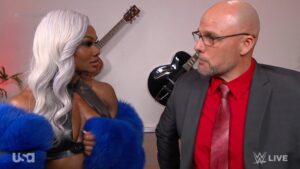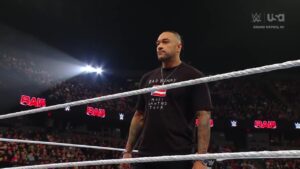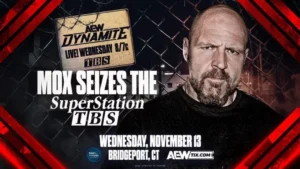Adam Page: Confidence Required
Pro wrestling requires confidence on all levels. Backstage, and in front of a crowd, kayfabe and reality. Wrestlers in the ring and their characters need assurance. Traditionally, locker rooms have been historical masculine environments that run on a hierarchy, pecking orders based on strength and power. Bravado is required everywhere.
Confidence is the fighter’s fist inside the boxing glove. The bite of the dog. The hormone that determines how big the proverbial grapefruits are. It’s the display of power. How seriously a wrestler is taken.
It’s traditionally what helps get every top wrestler to the pinnacle. That is their ability to prove they can walk the walk and talk the talk. But then historically, if you can talk folks into the building, that can be enough. It has always been that way. Look at any promo by top guys in WWE or AEW for evidence.
Cody Rhodes, whether suited or draped in the American flag’s colors, acts as if he is cut from a different cloth while also representing the fans. CM Punk and Drew McIntyre, whose hottest feud of the year, has been a battle of words and built on personalities and egos.
AEW’s top programs focus on who is strong enough to be the best. Will Ospreay vs. Swerve Strickland be built on the premise of killer instinct? Would Ospreay be willing to put Swerve in the ground? It was metaphorical, but the way they talked it up, sold the concept that a crime would be committed on PPV.
Bravado is how wrestlers traditionally have made the fans believe they can do it. Even if is false. Some fake it until they make it.
Except in one instance, one wrestler, who in AEW went against convention.
Weak and Real
“For years wrestlers were only seen as larger-than-life, colorful superhero types. Nobody ever really explored the idea of a wrestler being like a normal person, struggling with everyday emotions… It’s important to have sensitive, vulnerable characters who show that human side because more people watching can relate to a person like that.” Matt Jackson, Men’s Health.
At times it’s hard for me not to have parasocial similarities between myself and the character of “Hangman” Adam Page. I’ve written previously about AEW’s presentation of modern masculinity (here) and my background as an anxious millennial thirty-two-year-old teacher.
Adam Page as a character feels more real to me than anyone in WWE. That phrase of “cinema” used in WWE is apt in terms of WWE Hollywood. Even at its most authentic, there is a detachment. Cody Rhodes cries but is still a superhero. Roman Reigns is weak but hides this with ruthlessness, but unlike Tony Soprano never had a panic attack. Reigns must look strong, even in defeat.
Part of Page’s success is the depiction of human psychology within wrestling psychology. The overarching story of Hangman at its best has been about his struggles with mental health. Something my generation is highly aware of.
In a world where wrestlers are supposed to be strong and tough guys, Hangman got over and became a world champion by showing weakness and overcoming it. Hangman did not need to defeat his former tag team partner, Kenny Omega to be world champion. Page had to defeat the doubts and demons in his head to find the power to beat Omega.
Amidst the anxiety, there was something else still plaguing Adam Page in his current heel run and relapse (which I’ll analyze separately). Something that many people, including wrestlers (not their characters) experience.
Imposter Syndrome
Imposter syndrome is the feeling of anxiety related to waiting for the moment when someone’s going to reveal what a fraud you are. It’s about not feeling like you deserve something, let alone that you should be anywhere near the position you find yourself in. At some point, someone is going to realize they hired the wrong person. They picked the wrong partner. You aren’t good enough. They’re going to get rid of you like garbage.
It’s something MJF in promos has hinted at with a fear of rejection and ADHD. As a writer with dyslexia, I understand this feeling of inferiority and discussed when discussing neurodivergence and their history in wrestling.
It can hit anyone. People who experience some kind of success can feel like it’s undeserved and they are unworthy. Folks from Albert Einstein to Maya Angelou, and celebrities like Don Cheadle and Tina Fey.
In real life, many wrestlers feel this. How many wrestlers struggled with being “the man”? Shawn Michaels and Eddie Guerrero both suffered mentally and emotionally being the standard bearers for WWE.
LA Knight told “In the Klique” about feeling a kind of imposter syndrome hitting him before the 2024 Royal Rumble. MITB briefcase holder Tiffany Stratton and WWE Women’s World Champion, Liv Morgan have felt at points like imposters. Morgan told The Bump: “Like I never had the credentials to fulfill what I needed to do here.”
It’s a real feeling and an experience many can understand. Am I man enough? Am I good enough? Do I deserve this? Did I earn it?
With “Hangman” Adam Page these doubts and questions have been shown and told during his run towards the AEW World Championship from the very start.
Going Back to the Beginning
The “lore” of Hangman in AEW is built on Page’s history before its formation. It’s been cross-promotional and consistent. It’s not been retconned like a Marvel comic/film or Kane’s backstory. It stretches back to ROH and NJPW where early into his career, Adam Page was, in his own words:
“I was the guy who was the last to join the Bullet Club—on the house show that wasn’t even on TV, I was the guy who was getting beat in all these multi-man matches in New Japan. I was the guy who didn’t even have a winning record in (New Japan’s G1 Climax tournament).” Hangman” Adam Page, Men’s Health.
Page was always treated and seen within Bullet Club as the least significant member. The lackey. The bag man. The fall-guy. Bland and uninspired. Overlooked by many before AEW as the lesser member of The Elite. That bled into the storyline on Being The Elite (BTE) and to weekly Dynamites after Page failed to defeat Chris Jericho for the AEW World Championship.
To go from the lowest in the hierarchy to challenging for a championship, your friend the best in the world could not get, gave Hangman a chance to leapfrog perception and expectations.
Fans doubted Page could win. Page had his chance to prove every doubter wrong. This wasn’t about penis size as it comically had been before the first All In on BTE. Page had one shot to make a fresh start in AEW and to put himself ahead of his stable mates. He blew it.
The loss confirmed what everyone, including Page, already knew. Imposter syndrome brewed.
When The World Confirms You’re a “Jobber”
When real people are in a negative cycle of self-thought and self-loathing, all evidence is skewed. It all points back to being your fault. When bad things are said or happen, either because of your actions or someone else’s, it’s always evidence that your feelings are right. You’re what’s wrong. You’re the cause of problems.
The wins and the moments of joy alter to suit the narrative your mind constructs. The story that you don’t belong. You’re what’s wrong. Nothing you do is any good. You do only wrong and no right.
These feelings were shown rather than told through Hangman’s body language in segments with The Elite. Falling into the role of “side character” (to quote Vice) after losing his world championship opportunity, it’s a role Hangman self-fulfilled due to his insecurities.
Yet it’s also a role Hangman was pushed into by the status quo. By his friends. Back into the comfortable pecking order. Page’s support network didn’t see, notice, or care about Page’s insecurities. Partly, due to their issues.
When Nicholas Jackson negged and pushed Hangman’s buttons by calling Page “a jobber”, it reinforced to Page what he already knew was true. He’s stuck at the bottom. He was no good.
This isn’t toxic masculinity, not the type I’ve discussed elsewhere in The Bloodline storyline. However, its layers present how some young people react when they have been felt lied to by previous generations and society.
“In Adam Page, viewers were faced with another representation of a young person struggling to live up to their lofty dreams. Raised on the mantra that success means playing nice with higher-ups and waiting for your one shot at glory, a reputation for failure can follow you through your entire career.” Beau Windon, Vice.
When Victory Means Nothing
With imposter syndrome, with never feeling good enough despite how hard you work or the actual proof around you, your brain always finds something to remind you of your inferiority. Despite winning with Kenny Omega the AEW World Tag Team championships, before The Young Bucks, it did nothing in the short-term to impact Hangman’s issues.
If anything, it only made things worse. Consider the celebrations post-matches of Hangman drinking beer or whiskey and Omega and The Bucks drinking milk. It all becomes symbolic to the tainted mind.
We are very different. A sense of unworthiness grew.
Even victory over The Young Bucks at Revolution 2020. Page power-bombed Nicholas through a table, hit a one-winged angel, then buckshot lariat both Jacksons for the win. Then post-match, Hangman was so disconnected, so distant from his stable mates because the poison was in deep.
In the man’s own words to Men’s Health, the sense of inferiority remained despite proving his capability:
“I challenge you or anybody reading to imagine that you were standing in the ring, and your partner is one of the greatest of all time in Kenny Omega. … and (your opponents are), I would say, without question, the greatest tag team of all time in the Young Bucks. And then you were standing there.” “Hangman” Adam Page, Men’s Health.
Because post-match, despite retaining the championships, the dynamic remained the same. Page still felt like the lesser man.
When Support Changes Everything
These voices and doubts, along with the failings of his friendship group pushed Hangman to be the outsider of The Elite. The other members were wrapped up in their issues. They didn’t notice Hangman slipping further away and if/when they did, they didn’t support him.
As time proved, the ones to turn bad were Omega and The Bucks to win championship gold. Yet self-perception allowed FTR to manipulate Hangman. First, costing The Young Buck a number one contendership gauntlet, which resulted in Hangman’s exclusion from The Elite.
Rudderless, this led to Page’s long winding road to redemption. With The Elite this would not have been possible. Hangman would have remained and kept himself tethered to the past. Stuck in himself in that role of “jobber”. Trapped without the room to grow.
Mirroring real life in the sense that some people, stuck in an abrasive dynamic, cannot change unless the situation and environment change. It was through the support that allowed others to make changes. Dealing with them alone only works to some extent.
The Dark Order (who have suffered criminally from being underutilized) supported Page in finding self-acceptance. To find some confidence and assurance. With a quick bit of research online, you can find studies by psychologists and experts who point out the benefit of a strong support network in aiding mental health.
In Johann Hari’s Lost Connections, a book about the causes and steps to overcome depression, Hari highlights the isolation and the lack of community as two of the biggest contributors to poor mental health.
Hari also highlights how it is very possible to be surrounded by people, and a group, and still feel disconnected. Sometimes leaving behind your friends and forging new relationships becomes a means of combatting doubt.
Overcoming?
“I wouldn’t even say [the story] has borrowed from my real life, as much as it is [real life] … Each step of the way, I’d ask myself, ‘How do I feel about this right now?’ And I’d just give you the truth.” Men’s Health.
The reality of mental health is there isn’t a quick fix. It’s maintenance. When analyzing Page’s “I am a man” promo in discussing modern masculinity, Page presented that persistence and need to no matter the darkness, keep fighting. Get knocked down, you get up again.
The medicine can and does stop working and you fight on. Until you can’t. The problem is the poison creeps in again when your defenses are down.
The issue with mental health struggles is they don’t just disappear, like the bad guy killed in the climax of a Hollywood blockbuster. Page completed his story and yet winning the world championship didn’t solve the problems in his head. Reuniting with The Elite did not solve his issues.
That sense of feeling inferior doesn’t go away with accomplishments. The achievement hasn’t fixed my insecurity. No matter how much praise I receive in my various forms of work. It doesn’t matter how many articles or stories I publish. No amount of gifts, kind words, or flowers has or will resolve this feeling. A part of me always says that I’m a fraud.
And sometimes, like the character of “Hangman” Adam Page, that feeling of inferiority becomes something else. It leads to a relapse and self-destructive behavior again. It’s part of the cycle many experiences when their support networks weaken or difficult events cause change.
That’s part of the beauty of the Hangman character at present. It’s that reflection of something real.
More From LWOS Pro Wrestling
Header photo – AEW – Stay tuned to the Last Word on Pro Wrestling for more on this and other stories from around the world of wrestling, as they develop. You can always count on LWOPW to be on top of the major news in the wrestling world. As well as to provide you with analysis, previews, videos, interviews, and editorials on the wrestling world. You can catch AEW Dynamite on Wednesday nights at 8 PM ET on TBS. AEW Rampage airs on TNT at 10 PM EST every Friday night. AEW Collision airs Saturday at 8pm Eastern on TNT. More AEW content available on their YouTube.






